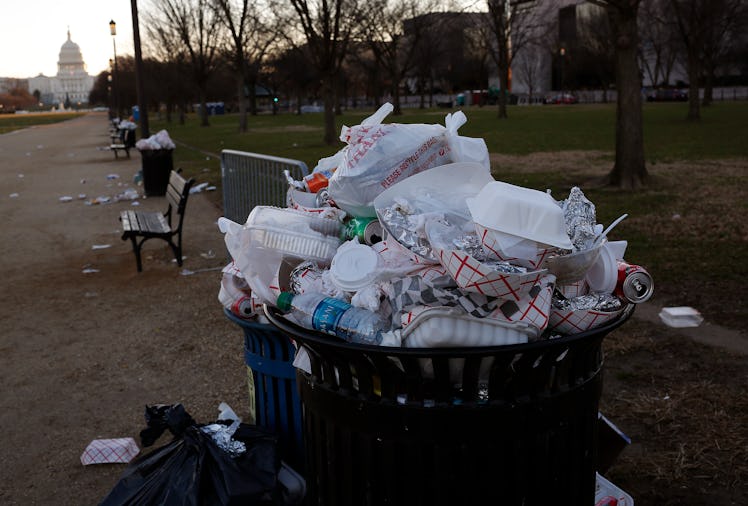
The Government Shutdown Had A Major Cost That We Won't Get Over
Life is starting to get back to normal after the government has reopened, and now the cleanup process begins. As some federal employees went back to work on Monday, Jan. 28, agencies are putting the pieces back together and taking inventory of the damage done. A report by the nonpartisan Congressional Budget Office (CBO) released on Jan. 28 highlights one big effect: How much the shutdown cost the U.S. in terms of dollars.
The partial government shutdown, which began on Dec. 22 and ended on Jan. 25, was the longest in the country's recent history. The total cost to the U.S. economy, per the report, was about $11 billion, and some $3 billion of that is gone for good. The CBO writes that the shutdown caused a drop in nation's gross domestic product (GDP), which measures the total output of goods and services, by about $3 billion in the end of 2018 and about $8 billion in the first part of 2019 for a combined total of $11 billion.
While the CBO estimates that some 75 percent of that may be recovered over time, roughly 25 percent — $3 billion — was gone forever. "Even though GDP is expected to rebound with the resumption in funding, some lost GDP will not be recovered," the report says. This is because, even though workers may get back pay and may temporarily boost their spending on goods, they won't exactly purchase the entire five weeks' worth of goods they were refraining from buying during the shutdown.
"The shutdown dampened economic activity mainly because of the loss of furloughed federal workers’ contribution to GDP, the delay in federal spending on goods and services, and the reduction in aggregate demand," CBO Director Keith Hall said in a statement on Jan. 28.
In fact, "the five-week shutdown delayed approximately $18 billion in federal discretionary spending for compensation and purchases of goods and services and suspended some federal services," the report reads. In other words, federal agencies weren't getting money from Congress, so as a result, they couldn't pay their workers, and couldn't pay for supplies and services that they would otherwise. And employees, without any paychecks coming in, couldn't spend money on goods or services, either.
GDP is expected to be down by another $8 million in first quarter of 2019, though it will eventually recover by the end of 2019. The impact will translate to a .02 percent decrease in the overall GDP for all of 2019 (which, percentage-wise doesn't sound like a lot, but in reality adds up to that $3 billion we were talking about before).
"Underlying those effects on the overall economy are much more significant effects on individual businesses and workers," Hall's statement reads. "Among those who experienced the largest and most direct negative effects are federal workers who faced delayed compensation and private-sector entities that lost business. Some of those private-sector entities will never recoup that lost income."
During a White House press briefing on Monday Jan. 28, Trump's top economic adviser Larry Kudlow disputed the CBO's conclusions. While he acknowledged that the burden on individuals was high, he argued there were no long-term negative effects. "The switch goes right back on," Kudlow told reporters. "There's certainly no damage to the economy."
In response to the report, House Democrats on Monday unleashed their criticism for the president and his demand for $5.7 billion in funding for a border wall, the sticking point in the month-long standoff which left federal workers unpaid at home or working without a check. Stories about the toll on those 800,000 affected employees have been circulating through the news since the shutdown began.
"The President's shutdown inflicted needless pain ... and stole billions of dollars from the economy," Speaker of the House Nancy Pelosi said, per MSNBC's Kyle Griffin. "Workers' financial security, families' well-being and America's economic strength all were senselessly sacrificed because of Pres. Trump's callousness."
"New CBO report shows it cost the U.S. $3 billion that it will never recover, and Trump still isn't getting his ridiculous wall," tweeted Rep. Raul Grijalva of Arizona.
"What a waste," wrote Democratic Rep. Judy Chu or California. "Shutdowns are not policy making tools."
The shutdown was temporarily ended on Friday when President Donald Trump and lawmakers agreed to pass a deal to punt the issue of border security funding down the road a few weeks and reopen the government until Feb. 15 while they continue to negotiate on it. The matter is now taken up by a group of 17 lawmakers tasked with appropriating the federal budget and coming up with a new solution that will appease the Republican-held Senate, the Democrat-held House, and Trump. In an interview with The Wall Street Journal Sunday, the president expressed a willingness to shut the government down again, however, if they fail to reach a deal that he supports.
For the sake of the economy and the federal workers who are just starting to get back to work, let's hope it doesn't come to that.